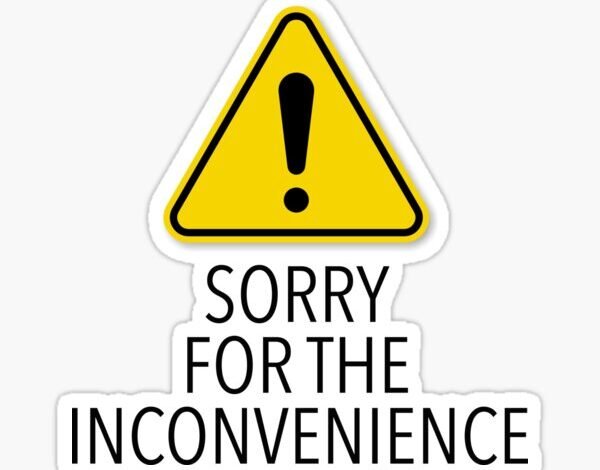“Sorry for the Inconvenience” – Why This Simple Phrase Matters More Than You Think

Have you ever been on the receiving end of a “Sorry for the inconvenience” message? It’s a phrase that we see and hear often, yet it rarely leaves us feeling satisfied. But why does this common apology matter, and what does it actually convey to those impacted? Let’s dive into the meaning behind this seemingly simple phrase, why it’s often used, and how businesses and individuals can make it feel more genuine.
Why Do We Say “Sorry for the Inconvenience”?
The phrase “Sorry for the inconvenience” is usually offered as a polite acknowledgment that someone’s time, effort, or plans have been disrupted. It’s commonly used in customer service settings, but we also see it in everyday interactions, emails, and even signs in public spaces. But why exactly do we use this phrase, and what does it mean?
At its core, “Sorry for the inconvenience” is an attempt to recognize the impact of an issue without going into too much detail. It’s a way of saying, “We know this situation isn’t ideal, and we appreciate your patience.” However, while it’s polite, the phrase can often feel impersonal or dismissive if not backed by a sincere tone or action to resolve the issue.

The Challenge with “Sorry for the Inconvenience”
While this phrase can be effective in expressing regret, it often falls flat. Why? One of the biggest issues is that it has become so common that it’s nearly a cliché. For many, hearing “Sorry for the inconvenience” can feel like an automatic, generic response rather than a genuine apology.
When people encounter issues, they want to feel understood and valued. A phrase that sounds rehearsed or impersonal may fail to convey empathy, leaving customers or acquaintances feeling brushed off. So, the real challenge lies in how this phrase is delivered and whether it is paired with meaningful actions.
Making Apologies More Personal
If you’re ever in a position to say “Sorry for the inconvenience,” try to personalize your response. Instead of simply repeating the phrase, think about how you can make your apology feel more heartfelt. For instance, saying something like, “I’m truly sorry for the disruption this has caused in your day,” can feel more genuine.
Using specific details can also make a big difference. For example, if you’re addressing a customer issue, mentioning the problem by name and acknowledging the specific impact shows that you’re truly listening. It’s about going beyond the standard response to make the other person feel seen and heard.
Going Beyond Words – Actions Speak Louder
An apology should never stop at words. Saying “Sorry for the inconvenience” without taking steps to correct the problem can make people feel that their time and frustration weren’t truly acknowledged. Consider adding a solution or explaining the steps you’re taking to prevent the issue from happening again.
For businesses, this might mean offering compensation, such as a discount or free service, as a gesture of goodwill. In personal interactions, it could mean making up for the inconvenience by offering an alternative plan or a small favor. Actions reinforce the sincerity of an apology, showing that you’re willing to go the extra mile to make things right.
The Role of Empathy in Apologizing
Empathy plays a crucial role in delivering an effective apology. When you genuinely put yourself in the other person’s shoes, your response will come across as more authentic. Imagine how you would feel if you were on the receiving end of the inconvenience. Would a simple apology satisfy you, or would you want more acknowledgment and understanding?
Expressing empathy might mean going beyond the phrase “Sorry for the inconvenience” and instead saying, “I completely understand how frustrating this must be. Here’s how I plan to make it right.” Small changes in wording can make a big difference in how your apology is received.
Apologies in Customer Service – Striking the Right Balance
In customer service, “Sorry for the inconvenience” is used frequently because it’s a quick way to address an issue. However, it’s important for businesses to balance efficiency with sincerity. Customers can tell when an apology is automated or forced, so it’s crucial to train representatives to handle each situation with care.
Offering a personalized apology, along with actionable solutions, can help retain customer trust and loyalty. When customers see that a business genuinely cares about resolving their issues, they are more likely to forgive the inconvenience and continue their relationship with the company.
Why Authenticity Matters
In a world where people are increasingly aware of insincerity, authenticity is key. When someone hears “Sorry for the inconvenience” and it feels genuine, it can actually strengthen their trust. Authenticity shows that you respect the other person’s time and experience, and that you’re committed to making things right.
People are more forgiving when they sense honesty and empathy. A genuine apology can make an inconvenience feel less frustrating and even turn a negative experience into a positive one. This is why authenticity matters so much in apologies – it can transform an otherwise mundane phrase into something meaningful.
How to Avoid Overusing “Sorry for the Inconvenience”
While apologizing is important, it’s also crucial not to overuse phrases like “Sorry for the inconvenience.” Over-apologizing can make you appear unsure or insincere, and it may cause people to take your apologies less seriously. Instead, use the phrase when it’s truly needed, and make each apology count.
For minor issues, consider alternatives to “Sorry for the inconvenience.” For example, you might say, “Thank you for your patience” or “I appreciate your understanding.” This shifts the focus from inconvenience to gratitude, which can be a refreshing change for the person on the receiving end.
How to Respond When You’re the One Inconvenienced
Being on the receiving end of an apology can sometimes be frustrating, especially if you feel the apology is not genuine. When someone says “Sorry for the inconvenience” but doesn’t back it up with action, it can be tempting to express your disappointment. However, responding calmly and constructively can often lead to a better outcome.
For instance, if a company apologizes but doesn’t offer a solution, you could say, “Thank you for your apology. Could you please explain what steps will be taken to prevent this in the future?” This keeps the conversation constructive and shows that you’re looking for a meaningful response.
Turning Inconvenience into Opportunity
Sometimes, an inconvenience can present an unexpected opportunity for growth. When you’re forced to address an issue, it can reveal areas where you can improve your communication, empathy, and problem-solving skills. Think of each inconvenience as a chance to refine your approach and connect more authentically with others.
For businesses, every inconvenience is an opportunity to learn more about customer needs and expectations. By viewing complaints or disruptions as learning moments, companies can improve their services and build stronger relationships with their customers.
Final Thoughts – Making “Sorry for the Inconvenience” Meaningful
“Sorry for the inconvenience” may seem like a small, simple phrase, but it carries a lot of weight. Whether you’re using it in a personal or professional context, make sure your apology is sincere, empathetic, and backed by action. By doing so, you’ll transform this common expression into something that truly resonates with others.
Next time you need to say “Sorry for the inconvenience,” take a moment to consider how you can make it feel genuine and thoughtful. After all, a well-delivered apology has the power to turn an inconvenience into an opportunity for connection and trust-building. Isn’t that something worth striving for?



